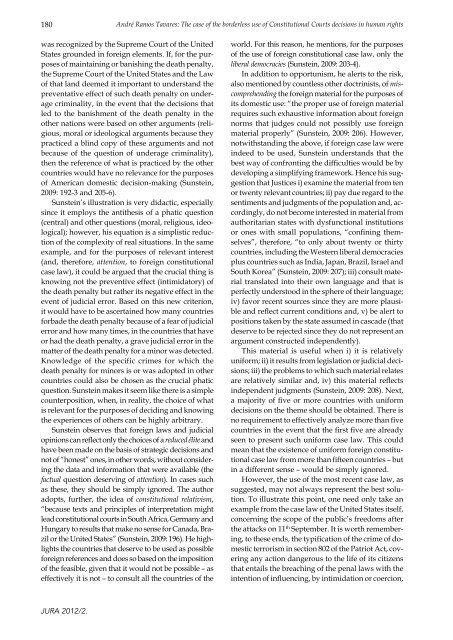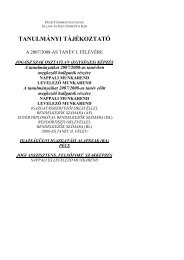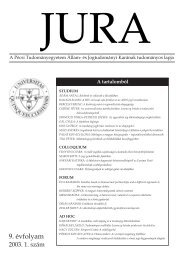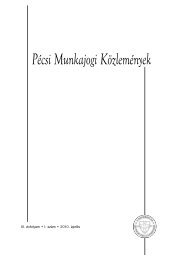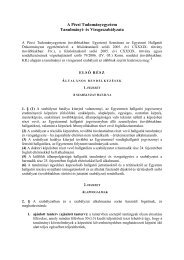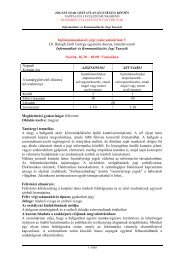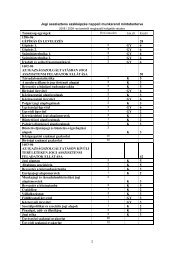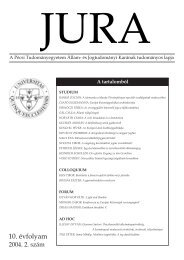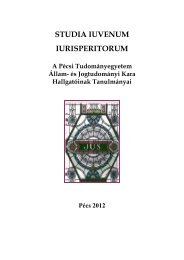2012. évi 2. szám - Jura - Pécsi Tudományegyetem
2012. évi 2. szám - Jura - Pécsi Tudományegyetem
2012. évi 2. szám - Jura - Pécsi Tudományegyetem
- TAGS
- jura
Create successful ePaper yourself
Turn your PDF publications into a flip-book with our unique Google optimized e-Paper software.
180 André Ramos Tavares: The case of the borderless use of Constitutional Courts decisions in human rightswas recognized by the Supreme Court of the UnitedStates grounded in foreign elements. If, for the purposesof maintaining or banishing the death penalty,the Supreme Court of the United States and the Lawof that land deemed it important to understand thepreventative effect of such death penalty on underagecriminality, in the event that the decisions thatled to the banishment of the death penalty in theother nations were based on other arguments (religious,moral or ideological arguments because theypracticed a blind copy of these arguments and notbecause of the question of underage criminality),then the reference of what is practiced by the othercountries would have no relevance for the purposesof American domestic decision-making (Sunstein,2009: 192-3 and 205-6).Sunstein’s illustration is very didactic, especiallysince it employs the antithesis of a phatic question(central) and other questions (moral, religious, ideological);however, his equation is a simplistic reductionof the complexity of real situations. In the sameexample, and for the purposes of relevant interest(and, therefore, attention, to foreign constitutionalcase law), it could be argued that the crucial thing isknowing not the preventive effect (intimidatory) ofthe death penalty but rather its negative effect in theevent of judicial error. Based on this new criterion,it would have to be ascertained how many countriesforbade the death penalty because of a fear of judicialerror and how many times, in the countries that haveor had the death penalty, a grave judicial error in thematter of the death penalty for a minor was detected.Knowledge of the specific crimes for which thedeath penalty for minors is or was adopted in othercountries could also be chosen as the crucial phaticquestion. Sunstein makes it seem like there is a simplecounterposition, when, in reality, the choice of whatis relevant for the purposes of deciding and knowingthe experiences of others can be highly arbitrary.Sunstein observes that foreign laws and judicialopinions can reflect only the choices of a reduced élite andhave been made on the basis of strategic decisions andnot of “honest” ones, in other words, without consideringthe data and information that were available (thefactual question deserving of attention). In cases suchas these, they should be simply ignored. The authoradopts, further, the idea of constitutional relativism,“because texts and principles of interpretation mightlead constitutional courts in South Africa, Germany andHungary to results that make no sense for Canada, Brazilor the United States” (Sunstein, 2009: 196). He highlightsthe countries that deserve to be used as possibleforeign references and does so based on the impositionof the feasible, given that it would not be possible – aseffectively it is not – to consult all the countries of theworld. For this reason, he mentions, for the purposesof the use of foreign constitutional case law, only theliberal democracies (Sunstein, 2009: 203-4).In addition to opportunism, he alerts to the risk,also mentioned by countless other doctrinists, of miscomprehendingthe foreign material for the purposes ofits domestic use: “the proper use of foreign materialrequires such exhaustive information about foreignnorms that judges could not possibly use foreignmaterial properly” (Sunstein, 2009: 206). However,notwithstanding the above, if foreign case law wereindeed to be used, Sunstein understands that thebest way of confronting the difficulties would be bydeveloping a simplifying framework. Hence his suggestionthat Justices i) examine the material from tenor twenty relevant countries; ii) pay due regard to thesentiments and judgments of the population and, accordingly,do not become interested in material fromauthoritarian states with dysfunctional institutionsor ones with small populations, “confining themselves”,therefore, “to only about twenty or thirtycountries, including the Western liberal democraciesplus countries such as India, Japan, Brazil, Israel andSouth Korea” (Sunstein, 2009: 207); iii) consult materialtranslated into their own language and that isperfectly understood in the sphere of their language;iv) favor recent sources since they are more plausibleand reflect current conditions and, v) be alert topositions taken by the state assumed in cascade (thatdeserve to be rejected since they do not represent anargument constructed independently).This material is useful when i) it is relativelyuniform; ii) it results from legislation or judicial decisions;iii) the problems to which such material relatesare relatively similar and, iv) this material reflectsindependent judgments (Sunstein, 2009: 208). Next,a majority of five or more countries with uniformdecisions on the theme should be obtained. There isno requirement to effectively analyze more than fivecountries in the event that the first five are alreadyseen to present such uniform case law. This couldmean that the existence of uniform foreign constitutionalcase law from more than fifteen countries – butin a different sense – would be simply ignored.However, the use of the most recent case law, assuggested, may not always represent the best solution.To illustrate this point, one need only take anexample from the case law of the United States itself,concerning the scope of the public’s freedoms afterthe attacks on 11 th September. It is worth remembering,to these ends, the typification of the crime of domesticterrorism in section 802 of the Patriot Act, coveringany action dangerous to the life of its citizensthat entails the breaching of the penal laws with theintention of influencing, by intimidation or coercion,JURA 2012/<strong>2.</strong>


